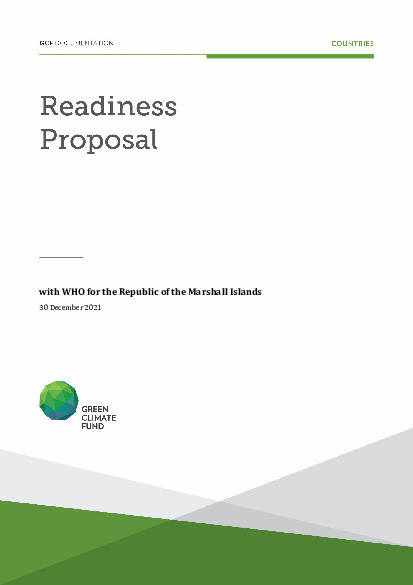Enhancing the resilience of health systems to climate change and emerging pandemics in the Republic of Marshall Islands

Enhancing the resilience of health systems to climate change and emerging pandemics in the Republic of Marshall Islands
1. The Republic of Marshall Islands (RMI), a small island developing state, is highly vulnerable to the health impacts of climate variability and change. Without substantial and proactive investment in adaptation in the health sector, including expanding reach to vulnerable communities and sub-populations, the current and projected climatic changes will result in increased health risks through direct and indirect pathways1. Currently the shortage of funds to implement programmes contributes to the fragmentation of health service delivery in RMI, despite a low spending rate. The per capita total expenditure on health at average exchange rate (USD) is 625.2 (2014) and there are approximately 40.1 skilled health workers (physicians, nurses and midwives) per 10,000 population. RMI suffers from both high rates of communicable and non-communicable diseases, including diabetes, obesity, and Tuberculosis. The under-five mortality rate (per 1000 live births) in 2015 was 36, and while RMI has a relatively high percentage of the population using improved drinking-water sources (94.5%), the population using improved sanitation facilities is roughly 77%2. Vector-borne diseases also continue to be a problem in RMI, including dengue fever, Zika virus, and chikungunya. In 2019-2020 there was a dengue fever outbreak, which is still on-going as of November 2020, resulting in a bit less than 4000 Marshalese having got Dengue-like illnesses with around half of them having been confirmed by laboratory test (MOHHS, Dengue type 3 Outbreak Sitrep, November, 2020)
2. While there has been progress related to climate change and health- related interventions and planning in RMI, greater coordination, strengthened capacity and strategic frameworks, and an increased knowledge base, can contribute significantly to building climate resilience of health systems. An opportunity exists to fill, previously identified gaps in adaptation planning for the health sector (e.g., limited governance and institutional coordination, and inadequate knowledge generation and dissemination), as well as scale up the scope and geographic reach of interventions to further reduce the health impacts of climate change3. The RMI Nationally Determined Contributions (2018)4 states that it is critical that steps are taken “to increase the adaptive capacity and resilience of its health system, with the most effective health adaptation strategies taking into account contextual factors to meet often highly localized adaptation needs.” Aligned with the NDC and Tile Til Eo Committee (TTEC), which serves as the organizing mechanism for climate change, priorities of the RMI, a focus on building climate-resilient health systems in the RMI can protect and improve population health by enhancing the capacity to anticipate, prepare for, respond to, and recover from climate-related exposures.
3. To follow through on the national commitments mentioned above and compliment the previous support from the GCF, the current proposal requests support to strengthen the capacity of NDA and climate change and health stakeholders to better understand and adapt to the health risks of climate change. This will involve improved coordination across sectors and from national to sub- national levels (i.e. reaching remote outer island / atolls), including engagement with the private sector and civil society organizations, as well as awareness raising and planning to develop medium-to-long term funding proposals to reduce climate change-related health risks. In addition, the proposal aims to ensure the strategic frameworks are in place to support the MOHHS and partners build health system resilience to climate change, including identifying and filling operational gaps, linking health with national climate policies and plans, and taking stock of available climate and health information, as well as urgent evidence gathering and analysis such as conducting rapid vulnerability and adaptation assessments, scoping the needs for the integration of climate and health data, training the health workforce to assess the climate-resilience and environmental impact of healthcare facilities, and communicating all-hazards risk to vulnerable populations. The direct beneficiaries of this project include all involved governmental staff, particularly in the MOHHS (total number of health professionals: 640). Further because the project focuses on enhanced health system resilience, reduction of climate-related health risks and vulnerabilities, the project will indirectly benefit the whole of the population of RMI (approximately 58,000 people).